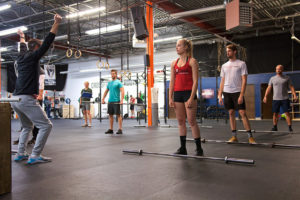Whether your staff likes or believes it, the athletes at your gym look to them for guidance and an example of how they should carry themselves inside and outside the gym. While this can feel like a daunting responsibility, here are four simple things your staff can do to lead by example and strengthen your gym.
Take Group Classes
Mentioning this as a small piece of this post does this topic a disservice, so maybe we’ll address it in full in a separate post! But for now, know that when your coaches take group classes, it sends a message to your members that your staff believes in your product, your programming, and the value of getting coached. It also proves the worth of your product.
Know that when your coaches take group classes, it sends a message to your members that your staff believes in your product, your programming, and the value of getting coached.
When your coaches take group classes and achieve a level of fitness desired by your members, it shows that your product can work with 4-5 hours of input each week. We know this to be true, but the message is often confused by the example a staff sets. Take for instance a gym that follows one programming for group classes, but the coaches each do their own programming or follow an online programming service, and workout on their own in the corner of the gym. When your coaches don’t take group classes it says to your members, “To be fit, you need to do different programming that takes a lot more time than you have to spare in your life.” This simple thought from your members can dissolve their trust in your program and start to pull at the cohesion and unity of your gym. No one wants that.
Eat Food In Front of Your Members
As an affiliate owner, I have been fortunate to work with a staff of coaches who believe in the ongoing value of good nutrition. While they have each experimented with different approaches to nutrition – Zone, paleo, macros, keto, and intermittent fasting, as a few examples – they have all stayed the course on their belief that real whole foods should be the foundation of a healthy diet. What’s more is that they have made this a consistent part of their life as they coach at all hours of the day. And this is brought to life through – Tupperware. They each prep, pack, and take their breakfasts, lunches, snacks, and dinner to the shop.
Awhile back one of my coaches was eating from his Tupperware while sitting on our lobby couches and it dawned on me that our athletes have probably seen him do this at least 400 times. My members get to look at a daily example of the relationship between consistently eating health food and fitness and physique that it yields
(To be clear, I am NOT saying your coaches should eat on the gym floor while coaching classes. That’s a no no.)
Scale a Workout
If we are to encourage effective scaling, our coaches need to lead the way. When coaches attend group classes

Coaches develop credibility not just while teaching classes, but also while being students in class.
and scale a workout, it demonstrates a humble athlete, who is not consumed by ego, and who believes in the results of proper scaling. It shows athletes that your coaches are human as well and that they are not “above the law” of the proper application of CrossFit principles.
Take the opposite example, and an affiliate is set up for discord. Suppose a coach explains to a class that they should scale the prescribed deadlift of 315/225 to 70% of their 1RM. Your male coach who is attending group class slaps 315 on the bar yet his 1RM deadlift is just 390 – meaning he’s loaded 80% of his 1RM onto the bar.
Once the workout starts, it is clear that the coach has too much weight on the bar and at the conclusion of the workout, he is at the tail end of finishers. A member notices this and asks the coach about his 1RM deadlift. He shrugs it off and says, “390, but I just wanted to do it RX.”
Wah, wah.
That single interaction has the power to discredit everything your affiliate has worked to promote and the credibility of the coach taking the class.
Log Their Scores and Record Detailed Notes in SugarWOD
We talked in a previous post about how to teach your athletes to record useful notes in SugarWOD along with their workout scores. Your coaches can lead by example here by recording workout notes in SugarWOD. I have found that when our coaches record detailed notes on their own workout for the day, the quality and number of notes taken by other athletes goes up for the day as well.
What’s more is that your coaches should log their workouts no matter what. Whether they won the workout, were last, scaled, or didn’t do as they hoped, they need to set the example that we record our workouts no matter the outcome.
The risk of not doing this is developing a culture where athletes post their scores only if they are proud of their effort or if they’re high up on the leaderboard. This mentality goes against developing a gym culture that respects the athletes who come on the days that address their weaknesses.